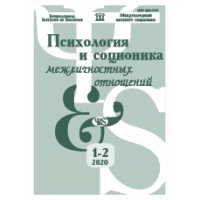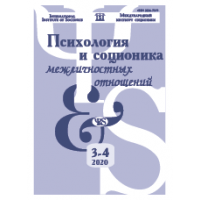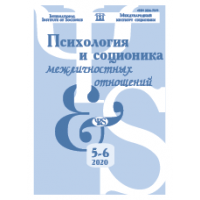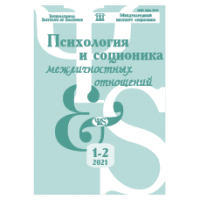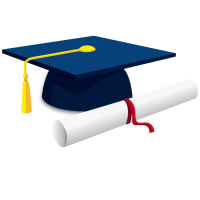Номер № 3-4/2021 журналу «Психологія та соціоніка міжособових відношень»
Дослідження
Криво Н.Є., Криво Ю.А.
< h4>Нестабільність фізіологічних та психоінформаційних параметрів при стресі: дослідження та відновлення із застосуванням соціоніки, системної психофізіології, когнітівістикиПроведено спостереження змін психічних та фізіологічних властивостей чоловіка у тривожному стані: посттравматичному стресовому розладі (ПТСР). Він має індивідуально нормальну (ортологічну) психоінформаційну характеристику: інтуїтивно-логічний екстраверт (ІЛЕ, IL) — тип моделі А. Аугустінавічуте (модель А); Я– Ти– Вони– Це– — підтип з установок Берна-Букалова; креативний підтип системи DCNH Гуленко-Букалова; статик за ознакою Аугустінавічюте-Рейніна. Спостережуваний відносно довго (кілька місяців) перебував у неортологічному стані за характеристиками: Це нормуючий динамік. Для визначення психофізіологічних властивостей, типу та підтипу в інтегрованій моделі А використано авторський фізіологічний метод Ю. Криво та аспектно-дихотомічний метод А. Букалова&О; Карпенка. Завдяки інтеграції підтипів та функціональної системи П.К. Анохіна в модель А та модель А.В. Букалова (модель Б) виявилося можливим: а) побачити взаємозв'язок психічних та фізіологічних змін активності людини при стресі (у тривожному стані пов'язаному з ПТСР), відмінних від його нормального — ортологічного стану; б) спостерігати зміну активності функцій нейронних мереж та відповідних їм функцій моделей А та Б; в) визначити можливості у діагностиці стресових змін активності у самовідчуттях, спостереженнях, фізіологічних тестах; , видами діяльності.
Ключові слова: посттравматичне стресовий розлад, стресові зміни особистості, тривожний розлад, індивідуальна норма, ортологічний, психоінформаційний метаболізм, диференціальна психологія, диференціальна психофізіологія, інтуїтивно-логічний екстраверт, «Дон Кіхот».
Псих >Литвиненко І.Ю., Шаповалова Л.А., Переверза Р.В. Самовідносини: явище та поняття (теоретико-методологічні дослідження)
Розглянуто самовідношення як психологічне поняття, для чого використані системні компоненти діяльності (СКД) та аспектне структурування. Запропонована модель самосвідомості, схематизована як структура «Я-концепції», а також у формі «методологічного тетраедра». -концепція.
Питання соціонічної освіти
Звонарьова Н.А., Коваленко Р.К.
Психологічні проблеми при вивченні соціоніки
Ця стаття є результатом практичної роботи психолого-педагогічної програми допомоги працюючій молоді з питань розвитку потенціалу особи. Виділено найбільш суттєві проблеми при знайомстві людини в мережі Інтернет з інформацією про типології особистості, а саме – її вплив на соціальну ідентифікацію людини та вибір партнера. Розглянуто низку проявів впливу вивчення соціоніки на різних стадіях процесу формування соціальної ідентичності. Запропоновано комплекс методів, який дозволяє впоратися з наслідками недбалого вивчення типологій особистості або провести профілактику подібних явищ.
Ключові слова: соціоніка; соціальна категоризація; соціальна ідентифікація; соціальна ідентичність; імаго; ТИМ; проблеми молоді; юнацький вік; індивідуація.
Математичні методи в соціоніці
Мінаєв Ю.П.
Центр групи операторів інтертипних відносин та біполярні ознаки типів інформаційного метаболізму
Ця стаття є двадцять шостою в серії публікацій, присвячених дидактиці математичних методів соціоніки. На цей раз буде представлений новий спосіб отримання двох груп біполярних ознак соціонічних типів. Цей спосіб ґрунтується на попередньому розподілі соціону на чотири частини за допомогою центру групи операторів інтертипних відносин. Кожну чверть соціону, отриману за такого поділу, можна як двох пар соціонічних типів трьома способами (з допомогою пар погашення, дуальних пар і пар суперего). Розглядати соціон як 8 елементна множина відповідних пар типів виявляється простіше, ніж як 16 елементна множина окремих типів. Такий розгляд дає можливість отримати всі перерізи соціону, яким відповідають елементи двох 16 елементних груп біполярних ознак із загальною 8 елементною підгрупою. А», група операторів, центр групи, біполярні ознаки, група Аугустинавічюте Рейніна ознак, група Юнга Мінаєва ознак. Соціальні портрети Шкавро З.М. Тім етико інтуїтивний інтроверт на прикладах На прикладах письменника Ф.М. Достоєвського та актора Віталія Соломіна розкрито особливості соціонічного типу етико-інтуїтивний інтроверт. З використанням інформаційної моделі психіки (моделі А) описано та проаналізовано роботу психічних функцій цього типу. раціональність.
Інтертипні відносини
Тарасюк А.А.
Ділові інтертипні відносини в сім'ї
Розглянуто підходи до побудови внутрішньосімейних відносин, підвищення їх якості шляхом урахування типів інформаційного метаболізму учасників. Описано можливості ефективної взаємодії в інтертипних «ділових» відносинах у сім'ї між ІЛЕ (IL) та СЛЕ (FL), взаємовигідна співпраця та яскраві больові точки.
< em>Ключові слова: соціоніка, модель А, інтуїція можливостей, вольова сенсорика, структурна логіка, етика відносин, сенсорика відчуттів, етика емоцій, інтуїція часу, логіка дій, відносини, функція, резонанс, базова, творча, больова, рольова, сугестивна, референтна, обмежувальна, реалізуюча, сила-слабкість функцій, інертна, контактна, лаборна, цінна .
Психологія та соціоніка 3-4/2021
- Модель: выпуск журнала «Психология и соционика…»
-
$5.00
- Ціна в бонусних бали: 50
Рекомендовані товари
Психологія та соціоніка 1-2/2020
Номер № 1-2/2020 журналу «Психологія та соціоніка міжособових відношень» Дослідження Ден..
$3.00
Психологія та соціоніка 3-4/2020
Номер № 3-4/2020 журналу «Психологія та соціоніка міжособових відношень» Практична психо..
$3.00
Психологія та соціоніка 5-6/2020
Номер № 5-6/2020 журналу «Психологія та соціоніка міжособових відношень» Дослідження Лаб..
$3.00
Психологія та соціоніка 1-2/2021
Номер № 1-2/2021 журналу «Психологія та соціоніка міжособових відношень» Інтертипні відн..
$6.00
Оформлення диплому бакалавра
Перш ніж сплачувати цей внесок, переконайтеся, що всі умови отримання ступеня бакалавра виконані: ви..
$140.00


